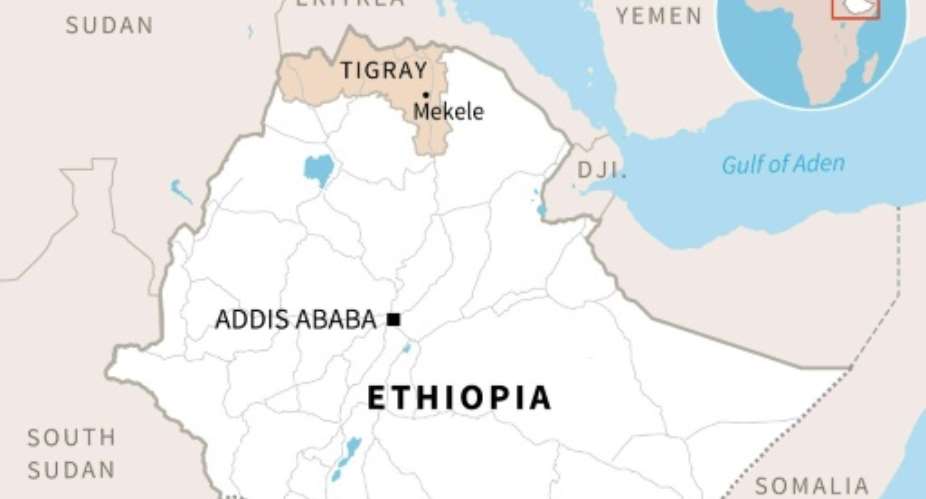An Ethiopian opposition official from the sensitive Oromia region was found shot dead on Wednesday, a few hours after being arrested by government forces, his party said.
Bate Urgessa of the Oromo Liberation Front (OLF) party was released on bail last month following his detention alongside French journalist Antoine Galindo.
The 41-year-old was arrested again late on Tuesday by "government armed forces" in a hotel in the town of Meki, 150 kilometres (93 miles) south of the capital Addis Ababa, OLF spokesperson Lemi Gemechu told AFP.
"Bate's family confirmed that he was found dead on a road in a place called Melissa, on the outskirts of Meki town," he said, adding that he had been shot.
The body was found on Wednesday morning, he added.
OLF, which considers itself the mouthpiece of the populous Oromo people, said in a statement that it had learnt about the death "with agony and grave sadness."
"The unwarranted and extrajudicial killing of conscious and active Oromo political and cultural figures has been a systematic and irresponsible act of silencing the Oromo throughout years and decades," it said.
The Ethiopian Human Rights Commission (EHRC) -- an independent state-affiliated body -- on Wednesday urged both the regional and central governments to conduct a "prompt, impartial and full investigation" into Bate's killing.
"Hold perpetrators to account," EHRC chief commissioner Daniel Bekele said on X.
Human Rights Watch also made similar appeals.
Conspiracy 'to create chaos'
Bate has been held in Ethiopian prisons on several occasions.
On February 22, he was arrested in Addis Ababa in the company of Galindo, a journalist with the specialist publication Africa Intelligence.
The two men were accused of conspiring "to create chaos" in the country. Bate was released on March 6, a week after Galindo.
In 2022, he was released on health grounds after a year in detention.
The OLF renounced armed struggle in 2018, prompting the Oromo Liberation Army (OLA) to split from the party.
Federal forces have been fighting OLA rebels in Ethiopia's most populous region Oromia ever since, while peace talks have failed to yield meaningful progress.
The OLA's strength, estimated at a few thousand men in 2018, has increased in recent years, though observers believe it is insufficiently organised or well-armed to pose a real threat to the government.
The Oromo ethnic group accounts for about a third of the 120 million inhabitants of Africa's second most populous country.
Classified as a "terrorist organisation" by Addis Ababa, the OLA has been accused by the government of orchestrating massacres, something the rebels deny.
The authorities in turn are accused of waging an indiscriminate crackdown that has fuelled Oromo resentment.
The OLF says Prime Minister Abiy Ahmed's government has closed many of its offices, hindered its participation in elections and imprisoned several of its leaders, some of whom have been in custody for years without trial.





 “Stand and greet me”: Ban all NPP activities on your land until Akufo-Addo apolo...
“Stand and greet me”: Ban all NPP activities on your land until Akufo-Addo apolo...
 Election 2024: We won't allow you manipulate the process in favour of Bawumia — ...
Election 2024: We won't allow you manipulate the process in favour of Bawumia — ...
 Akufo-Addo’s arrogant attitude and utterances give much cause for concern — Maha...
Akufo-Addo’s arrogant attitude and utterances give much cause for concern — Maha...
 Cleaner to face court over Cashier’s death at Twumasiwaa Hospital
Cleaner to face court over Cashier’s death at Twumasiwaa Hospital
 Dumsor under Mahama managed better than Akufo-Addo – Betty Mould-Iddrisu
Dumsor under Mahama managed better than Akufo-Addo – Betty Mould-Iddrisu
 GUM won't join Alan’s ARC – Osofo Kyiri Abosom
GUM won't join Alan’s ARC – Osofo Kyiri Abosom
 Jesus Christ died for people in his era, not for me – Osofo Kyiri Abosom
Jesus Christ died for people in his era, not for me – Osofo Kyiri Abosom
 Bawumia promises 100% Ghanaian ownership of natural resources
Bawumia promises 100% Ghanaian ownership of natural resources
 Driver, teacher in court over GHC1million auto fraud
Driver, teacher in court over GHC1million auto fraud
 Ejisu by-election: 'Voting for Aduomi is handing over power to Mahama' – Bawumia
Ejisu by-election: 'Voting for Aduomi is handing over power to Mahama' – Bawumia
